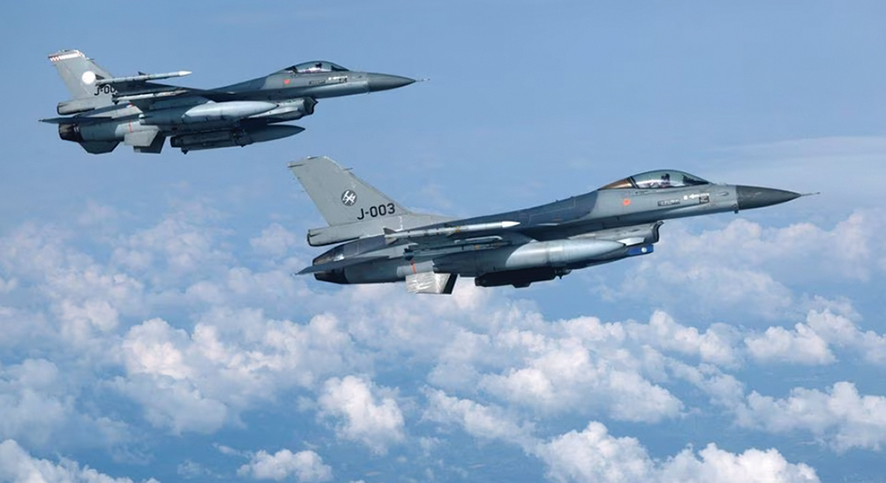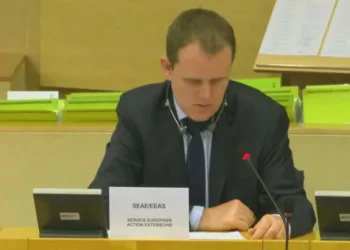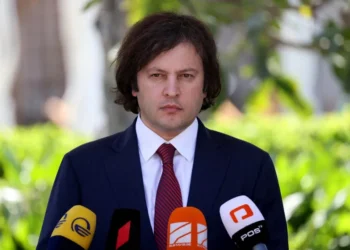RFE/RL’s Georgian Service sat down with Con Coughlin, Defense and Foreign Affairs Editor at The Daily Telegraph, to discuss the F-16s and their potential impact in the ongoing counteroffensive in Ukraine, and Western support for Ukraine’s territorial integrity.
“The fact that Ukraine is getting these aircraft does represent a serious upgrade in its military capabilities. And it also deepens their military relationship with the NATO Alliance, which looking to the future will be very important for Ukraine to maintain its independence and sovereignty,” Coughlin notes.
We ask him about their impact on the ongoing counteroffensive.
“At the moment, I’m not sure that they will be operating in time to contribute to the current counteroffensive, because it takes quite a long time to get these aircraft embedded in the air system. It could be done, but it’s unlikely,” he says.
The established consensus in the West is that the Ukrainian counteroffensive is going slower than expected and achieving less than what was hoped for. What are the reasons for the slow progress and modest gains?
Well, first of all, it is very hard to assess the exact nature of the progress that is or is not being made, but the fact is that they do not have air cover. And with this kind of military operation, if you don’t have air cover, then your ground forces are very exposed. President Zelensky himself has admitted that without proper air defenses, you are sending young Ukrainian men and women to their deaths. So those types of considerations have impeded the pace of advance. And saying that, the Russians are also in a bad position. They’ve lost roughly about half their military gear and morale is said to be low. So there is also the possibility that the Russians will collapse if the Ukrainians break through.
How big is that possibility?
Ukrainians have got some very well trained, well equipped units. Nearly a dozen new combat brigades have been built up over last year, trained by the West, equipped by the West with NATO equipment, NATO attire, NATO heavy armor, artillery missiles. I think these are effective groups, if used properly. At the moment, a lot of these brigades have been held back from the main fight, because what’s been going on throughout the summer is the Ukrainians probing the Russian defense, looking for a weak spot. I think if they found a weak spot and exposed it properly, then this could move very, very quickly, but it’s a very big IF at the moment.
And how much time do they have to find this weak spot? How much time can they afford themselves, looking for weak spots?
Well, if you remember, at the end of last year, a lot of the big Ukrainian successes near Kherson and Kharkiv were achieved in the autumn, in September-October. So, until winter really sets in, in late November, there is a possibility to move forward on the ground and there’s a possibility of a wider military operation being conducted by sea and air. So, if we are looking for big strategic gains, I would expect something significant by November.
According to the Washington Post, US intelligence believes that Ukraine will fall short of capturing Melitopol or any other target of large strategic importance that would allow it to sever the land bridge to Crimea. If that indeed comes to pass, where does it leave us?
Well, if that happens, then I think you end up with a conflict that neither side can win. I mean, first of all, I don’t think after the fiasco with the Wagner group, one of the most effective Russian battle units, that the Russians can win. And then if, as the American intelligence assessment suggests, the Ukrainians can’t take these sort of targets, then we’re looking at a deadlocked conflict. What I would say, though, is that there are people in Washington, in the Biden administration, who, in my view, do not want Ukraine to win: they want to get a deal, to negotiate a deal by the end of the year, before next year’s presidential election campaign. They don’t want Ukrainians to succeed on the battlefield, because that would complicate any efforts on the diplomatic front from that perspective. So when these reports come in, it’s fair to ask the question, is this negative propaganda put out by the Americans to undermine the Ukrainians, because they want to maintain diplomatic contacts? Or is it a genuine intelligence assessment? There’s a lot of politics going on at the moment.
What’s the rationale for not wanting Ukraine to win? Wrap this up by the end of the year and then present it to the voter as a victory for peace? Will it sell like that?
Well, that’s what they will try to do. I think that would be a big betrayal of the Ukrainian cause, and if you surrender Ukraine’s territorial integrity, then you set a very bad precedent for the rest of global security. So I think it’s a very bad idea myself. But we’ve already heard from senior people in NATO that Ukraine won’t be able to win this war and might have to give away territory. There are lots of people in the NATO alliance, both in Washington and in Europe, who would prefer a negotiated settlement and who are prepared to sacrifice Ukraine’s territorial integrity to achieve that aim.
What I think you’re referring to is the recent statement from Stian Jenssen, Sec Gen Stoltenberg’s head of staff, which was then quashed by NATO. Was it testing the waters to see the reaction of the wider public?
Yes. If you look at the recent NATO summit in Vilnius, Ukraine went to that summit asking for guarantees that Ukraine would be granted NATO membership. That was refused, because that would have meant NATO had an obligation to protect Ukraine’s territorial integrity. I think the reason NATO leaders failed to respond positively to that request is that they don’t want that commitment. They don’t want to preserve the territorial integrity of Ukraine. And so then, a couple of weeks later, you get senior NATO officials saying what we all suspected was being said behind closed doors in public, and, of course, Zelensky denounced this ridiculous suggestion. But if this becomes a big power negotiation between Moscow and Washington on how to end the war, then Ukraine’s interests might be completely overlooked.
And will Zelensky and Kyiv have to bow down to that request, considering the spigot of military assistance is in Western hands?
It will be very difficult to continue the war without Western support. Although there is a very sharp difference of opinions within the NATO alliance between frontline countries like Poland, now Denmark and other Scandinavian countries, the Baltic States- there are a lot of countries who feel very strongly that Ukraine must win this conflict for the long term security of their own space, and also Europe. So it is a very challenging issue, but there are also people who are anticipating that Ukraine will not prevail on the battlefield, which will lead to a negotiated settlement and the Ukrainian sellout.

Is this part of what I’ve seen described as Ukraine fatigue, or are other things at play here?
I think Ukraine fatigue is an element. And, of course, you’ve had the cost of living prices, particularly in Europe, caused by high energy prices, in turn caused by Putin, his attempts to blackmail the West over energy supplies, but these have been mitigated. In a lot of European countries, energy prices have stabilized, the cost of inflation is coming down. So these pressures, which I think contributed to Ukraine fatigue, are being mitigated. But I think people are inevitably getting more weary of the war and the conflict, and particularly when there is this ongoing talk of grain shortages, food crises and so on. So that will be an inevitable thing. But some of the most recent opinion polls I’ve seen in Europe suggest that overall support for the Ukrainian cause remains strong.
You write that to achieve victory, “the Ukrainians need to have a kill-rate ratio of 8:1, eight Russians killed for every Ukrainian”. How far are we from those numbers today and what would it take to bring them up?
The kill ratio of 8:1 is what’s needed to really put Russians under pressure, and that is also because of the relative sizes of the Russian and Ukrainian military. Russia, for all its setbacks, still has the infrastructure. So that is why it comes down to this kill ratio. Last time I looked, it was about 3:1. And we know through the last century or more that Russian commanders pay very little attention to battlefield casualties: they employ what we call meat grinder tactics, where whole battalions are sent forward without any regard for their safety, just to whittle down the enemy. We don’t do that in the West. And Ukrainians don’t do that – if they did, the West would stop supporting them. It’s an ugly term, but it’s the reality of war. War is a very ugly business. But this ratio is what you need to inflict a devastating defeat on Russian forces, and looking at how Putin runs a country, I think it’s in all our interests to see the back of this Putin regime and see a more stable and responsible one in its stead.
Has the West done enough when it comes to military assistance, and in expedient enough a manner?
Well, the West has certainly been very generous in its support for Ukraine, there’s no doubt about that. The Americans, the Germans, the British, have spent billions of dollars and euros in military support. But there has also been some misuse, some challenges which have not been addressed. First of all, the Americans were reluctant to provide long-range missiles. Then there were the arguments about the main battle tanks. And then about warplanes – all these arguments have led to delays in the provision of equipment. And there’s no doubt that had the West responded earlier to these requests, that would have made a material difference to the Ukrainian war effort on the battlefield.
Having said that, a lot of these systems, like the US Abrams main battle tank, are integrated into the US military but no other military, so making them operational with the Ukrainian force is a big challenge. I think it is fair to say the West has dragged its feet on the revision of some of the more top-end equipment, but it’s got there eventually. And I think the fact that it’s now prepared to give these weapons helped consolidate Ukraine’s position within the Western alliance and demonstrates a long term commitment to protect Ukraine’s sovereign integrity.
There have been criticisms that Ukraine is unable to replicate the Western mantra of combined arms maneuver warfare. Has it been given enough to actually stage combined arms maneuver operations?
My understanding is that, having spoken to some of the Western generals responsible for training the Ukrainians in combined arms warfare maneuvering, they have the kit, there is no doubt about that. But these are ground operations. And the Americans, for example, wouldn’t dream of undertaking these operations without proper air protection. And that is the Achilles heel of the whole thing. So they’ve got the kit, they’ve had the training, they have resources, and the Western military commanders I’ve spoken to, who’ve been involved in this, and inspected Ukrainians, have been very impressed with what they can achieve. But there are limits to what can be achieved in the circumstances without air power.
And this brings us back to the F-16s. Two of the latest pieces you published in the Daily Telegraph have very telling headlines: “Putin’s plot to split the West may be succeeding” and “The West doesn’t want Ukraine to beat Russia.” Has the greenlight on F-16s alleviated your concerns somewhat?
Well, all I would say is it’s moving in the right direction. I still wonder when the F-16s will arrive and after they have arrived, how soon it will be before they’re deployable. These are sophisticated systems that need to be fully integrated into the Ukrainian military before they become effective and operational and not vulnerable to Russian countermeasures. So it’s a big step. And had the decision been taken at the end of last year, when the Ukrainians originally made the request, then these systems could have been operational by late spring this year, and made a very big difference. That hasn’t happened. And that is why you find me writing articles questioning whether the Americans are more interested in a negotiated settlement and whether we are being robust enough in the West to counter Putin’s invasion.
If things go as they are going now, what will the next headline be?
I would love to write the headline: “The Ukrainian victory is celebrated as Russia suffers massive battlefield disaster.” But I don’t think I will be writing that in the near future.
Interview by Vazha Tavberidze














